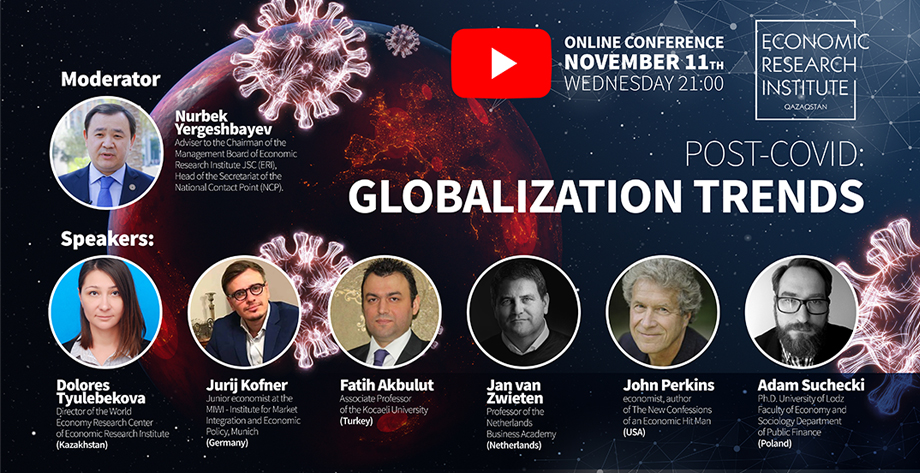Post-COVID: Globalization trends
12.11.2020
 On November 11, an international conference of the Economic Research Institute was held with the participation of Leading Economists from Kazakhstan, the United States, the Netherlands, Germany, Turkey, and Poland. A large-scale discussion was devoted to the issues of globalization and international integration-problems and prospects for further interaction between the economies. The meeting was opened by Nurbek Yergeshbayev, the Head of the Secretariat of the National Contact Point (NCP) of the OECD, Adviser to the Chairman of the Management Board of Economic Research Institute JSC: Welcoming the participants of the conference, Mr. Yergeshbayev noted the special relevance of the discussion of economic integration issues. "The world's population, which is approaching 8 billion people, faces certain disadvantages, challenges, and problems of the global economy. The coronavirus pandemic has had a negative impact on it, affecting all countries, although to varying degrees ...". "As everyone knows, the globalization of the economy is a complex and contradictory process", continued the discussion Dolores Tyulebekova, Director of the World Economy Research Center at the Economic Research Institute JSC. On the one hand, it promotes economic cooperation between states, creates conditions for countries to access the best achievements of humanity, saves resources and stimulates world progress. On the other hand, globalization has negative consequences: consolidation of the peripheral economic model, the loss of their resources by countries not included in the "Golden Billion", the collapse of small businesses, the spread of globalization competition to weak countries". The expert also noted that according to the World Bank, each subsequent crisis has a significant impact on GDP growth rates everywhere. Thus, the oil crisis in 1975 led to a drop in world gross product by 0.4%, and the energy crisis in 1980 reduced the indicator by 0.6%. In 2008, the global economic crisis also affected GDP: -1.7%. 2020 pandemic led to a 4.4% decline in global GDP. In addition, according to UNCTAD, the COVID-19 crisis will cause a sharp reduction in foreign direct investment. "Global foreign direct investment inflows are projected to decrease by 40% in 2020, compared to USD 1.54 trillion in 2019. According to forecasts, in 2021, FDI will decrease by another 5-10% and begin to recover in 2022", Dolores Tyulebekova said. By the end of 2021, experts expect economic recovery due to the recovery of world commodity prices and the revival of trade. "In my opinion, there are several scenarios for the development of the world economy: autarkic - the transition to the possibility of self-sufficiency and import substitution. But in this case, it is necessary to recall the experience of Latin American countries, as in the case of Kazakhstan, which are characterized by a raw material orientation of production. Import substitution had many advantages (...) (but) subsequently, the policy of import substitution began to create serious problems for the economies of those countries that followed it for a long time. (…) The second option for developing cooperation in the framework of international trade is to review the functioning of existing integration platforms. In the post-crisis period, countries are already beginning to gradually restore their economies, including through the resumption of trade ties. It should be noted that integration associations are also returning to established forms of cooperation, taking joint measures", the Analyst concluded, adding that the main trend of the new economy should be export orientation".  Rector of the Netherlands Academy of Business, Professor Jan van Zwieten is sure that globalization has recently led to negative consequences. One of the negative factors of this phenomenon was the pandemic. No less frightening is the crisis in the banking sector, which has affected all countries - the effect of globalization. "The Government of Netherlands spent 76 million euros to restore the economy after the introduction of quarantine. ... No one has lost their job, all companies receive support, but how long is it possible to provide it?" Analyzing the situation in the financial sector, van Zwiten drew a parallel between the current crisis and the 2008 crisis that ruined large corporations. "Against the background of the mortgage crisis, the shares of Freddie Mac (the largest American Mortgage Agency-ed. note) from the beginning of 2008 to the middle of July of the same year lost more than 80 % of the value...". The Scientist also mentioned in his report the once largest conglomerate, Lehman Brothers, - the first player in the market for initiating mortgage loans. Its bankruptcy is considered to be the starting point of the global financial crisis at the end of 2008. In turn, Turkish Economist, Professor Fatih Akbulut suggested that the impact of globalization on regional and country trends depends on the stage of development of the region in question. "Regions that are at a lower stage of development and are more dependent on factors of production are less competitive on a global scale, therefore, the impact of globalization on them is greater. In turn, innovative regions that are at a higher stage of development are more competitive in the world and can more easily resist the forces of globalization', the speaker's report says. The competitiveness of regions is based on such factors as higher education and training, the efficiency of the commodity market, the development of the financial sector, and innovation - Mr. Akbulut is convinced. Taking this into account, it is important for governments to decide which tools can be more effective for economic growth. Polish Economist Adam Mateusz Suchecki examines the effectiveness of the state budget and the economy in the field of culture. There is no doubt that this area has been significantly affected by the pandemic. Perhaps it was too closely linked to global economic processes… "The general economic downturn leads to significant losses in the field of art and mass events. Cultural institutions in Poland are mainly application institutions in privat.organizations and are in a dependent position. Probably, the situation will worsen", commented Adam Suchecki In his opinion, the downward trend in the share of municipal spending on culture may indicate a change in the direction of cultural policy and, as a result, the cultural development of countries. "We did it ourselves" – this is how the American writer, researcher and activist, author of the book "Confessions of an economic killer", John Perkins, began his speech. "What many economies today call the gas economy is an economic system that is, in fact, dying out" - according to the writer, humanity has come to the stage of changing paradigms, re-evaluating global phenomena. John Perkins, who has advised the World Bank, the United Nations, the IMF, the U.S. Treasury Department, Fortune 500 corporations, and leaders in Africa, Asia, Latin America, and the Middle East, is currently a leading economist at an international consulting company, and the founder and Chairman of Dream Change Inc. However, according to the economist himself, the current situation with the pandemic raises first of all questions of an existential nature, and only then - economic: "GDP is a very bad measure of well-being. It only measures the wealth of wealthy people, it does not measure overall wealth, as I was taught to believe. … I think that today it is necessary to recognize this. Moreover, I think that today we are all involved in the formation of a new economic policy:", he said. The concept of a market economy, according to the analyst, should remain in the past. However, most of the existing markets operate under market conditions. Moreover, a significant number of players have some degree of global market influence that determines how competitive a country is. So how soon will economies have to break up global economic monopolies to make room for new, more flexible economic structures? The answer to this question is most likely related to the prospect of the end of the pandemic and the review of key policy programs by governments. In the meantime, one thing is clear: large-scale integration and international cooperation will become one of the key trends in the post-crisis economy. See you soon!
Views: 6468 |
|
||||||||||||||||||||||||||||||||||||||||||||||||||||||||||||||||||||||||||||||||||||||||||||||||||||||||||||||||||||||||||||||||






|